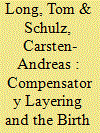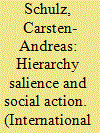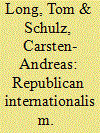|
|
|
Sort Order |
|
|
|
Items / Page
|
|
|
|
|
|
|
| Srl | Item |
| 1 |
ID:
157357


|
|
|
|
|
| Summary/Abstract |
The Second Hague Conference of 1907 is widely regarded as a turning point in the evolution of international society. Constructivist and English School accounts, in particular, highlight the active role played by Latin American delegates in advocating the principles of sovereign equality and nonintervention. I argue that this common interpretation erroneously relies on a retrospective reading of the “norm entrepreneurship” of Latin American states. Rather than aiming to transform the hierarchical international order of the time, foreign policy elites from Latin America sought to use the conference as a platform for increasing their countries’ status. Because of their comparative lack of resources, smaller powers will often try to pursue status through diplomacy and the use of international law, and their status gains in multilateral settings depend on the acquiescence of higher-ranked states. This explains both the diplomatic posturing of Latin American delegates at The Hague and their failure to make substantive status gains.
|
|
|
|
|
|
|
|
|
|
|
|
|
|
|
|
| 2 |
ID:
184322


|
|
|
|
|
| Summary/Abstract |
The idea of Chile as a ‘bridge country’ that connects – or should connect – Latin America with the Asia-Pacific region has guided its commercial diplomacy since the early 1990s. We argue that this geopolitical vision corresponds closely with what network analysts describe as a ‘broker’: an actor that bridges ‘structural holes’ by connecting otherwise disconnected actors or groups of actors. As a relational approach, social network analysis provides an alternative way of thinking about Chile’s position in international relations that does not rely on preconceived groupings or rank orders based on country attributes, as in the case of ‘middle powers’ and ‘small states.’ Further, the approach allows us to empirically explore which countries of the Pacific Basin currently perform such a role and whether (and when) Chile conforms to the theoretical expectations of a ‘transpacific broker.’ Using network data on commercial agreements (1980–2018), we trace Chile’s emergence as a transpacific broker and discuss how its commercial diplomacy provided the country with leverage in this regard. In doing so, the study sheds light on the opportunities and limitations of peripheral actors seeking to gain social capital through networks of relations.
|
|
|
|
|
|
|
|
|
|
|
|
|
|
|
|
| 3 |
ID:
191904


|
|
|
|
|
| Summary/Abstract |
International organizations come in many shapes and sizes. Within this institutional gamut, the multipurpose multilateral intergovernmental organization (MMIGO) plays a central role. This institutional form is often traced to the creation of the League of Nations, but in fact the first MMIGO emerged in the Western Hemisphere at the close of the nineteenth century. Originally modeled on a single-issue European public international union, the Commercial Bureau of the American Republics evolved into the multipurpose, multilateral Pan American Union (PAU). Contrary to prominent explanations of institutional genesis, the PAU's design did not result from functional needs nor from the blueprints of a hegemonic power. Advancing a recent synthesis between historical and rational institutionalism, we argue that the first MMIGO arose through a process of compensatory layering: a mechanism whereby a sequence of bargains over control and scope leads to gradual but transformative institutional change. We expect compensatory layering to occur when an organization is focal, power asymmetries among members of that organization are large, and preferences over institutional design diverge. Our empirical and theoretical contributions demonstrate the value a more global international relations (IR) perspective can bring to the study of institutional design. international relations (IR) scholars have long noted that international organizations provide smaller states with voice opportunities; our account suggests those spaces may be of smaller states’ own making.
|
|
|
|
|
|
|
|
|
|
|
|
|
|
|
|
| 4 |
ID:
164836


|
|
|
|
|
| Summary/Abstract |
Hierarchy is a persistent feature of international politics. Existing accounts recognize that there are many ways in which actors can stand in relation to one another. Yet they struggle to make sense of this complexity. This study considers Max Weber’s contribution to understanding international hierarchy. It discusses three ideal types of stratification based on the distribution of capabilities (class), estimations of honor and prestige (status), and command relationships (authority). Following the neo-Weberian approach, these dimensions matter because they make social action intelligible. Furthermore, Weber clarifies how class and status are connected and how these two dimensions relate to authority through the process of ‘social closure’. The study concludes that scholars who focus exclusively on authority structures miss the fact that authority typically derives from other forms of stratification: although based on different logics of social stratification, class and status hierarchies often coalesce into (legitimate) authority.
|
|
|
|
|
|
|
|
|
|
|
|
|
|
|
|
| 5 |
ID:
188670


|
|
|
|
|
| Summary/Abstract |
Although Latin America plays a minimal role in debates on the ‘liberal international order’, scholars recognise the region’s influence on international law, norms, and institutions. We contend that these Latin American contributions to international order spring from a tradition of ‘republican internationalism’, rooted in the region’s domestic political traditions and practices. Republican principles such as the separation of power, association, and the rule of law had important corollaries in Latin American international relations, including sovereign equality, confederation and regional cooperation, and international law and arbitration. These republican internationalist ideas shaped Latin America’s diplomatic traditions and its contributions to international order in the nineteenth century and beyond. Attention to republican internationalism and Latin American contributions demonstrates how actors beyond the North Atlantic shaped the origins of international order. This study also advances debates on the sources of the liberal international order by demonstrating the distinctive influence of republican ideas and practices.
|
|
|
|
|
|
|
|
|
|
|
|
|
|
|
|
|
|
|
|
|